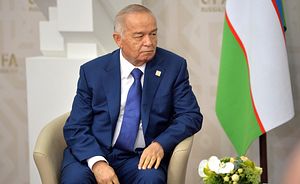Weekend Central Asia reads:
Sculpting Karimov: It’s not surprising that Uzbekistan is planning a statue of Islam Karimov. He was, for good or ill, the country’s first president. What’s a little surprising, as Bruce Pannier explained this week, is the choice of artist. Ilhom Jabbarov, 72, is one of the country’s greatest artists. His works dot the country’s key cities, and he knew Karimov personally. But the two had a bit of a falling-out over artistic direction four years ago, Pannier writes. Although Jabbarov did not end up in prison, he did leave Tashkent for the hills and became a beekeeper. Nonetheless, authorities — a committee led by Abdulla Aripov, who had his own falling-out with Karimov — chose Jabbarov to sculpt Karimov’s statue. Pannier puts it succinctly: “So a man whom Karimov fired has helped select a man Karimov humbled and essentially exiled to build a statue to Karimov.”
Kazakhstan’s Slick Promises: Kanat Shaku, writing for bne Intellinews this week, explains the “two-sided statement” coming from Kazakhstan’s energy ministry regarding “its (non)participation in the non-OPEC voluntary oil cut.” Put simply: Astana, along with an array of other non-OPEC countries, agreed to extend the oil output cut decided last December by 9 months, but as Shaku notes, “It appears obvious that Kazakhstan has no intention of reining in its output in the near vicinity of time.” Given Kazakhstan’s dependence on oil revenue and small share of the global market (relative to producers like Russia and Saudi Arabia), somewhat empty promises from Astana are not terribly damaging to the overall production cut regime.
Black Humor Goes Amiss in Kyrgyzstan: The movie-makers simply wanted an amusing musical trailer for their horror flick, but as Nurjamal Djanibekova writes for EurasiaNet, for some they missed the mark and instead kicked up a controversy. To promote their horror film Albarsty — an evil, mythical creature from Kyrgyz folklore that comes at night and strangles people in their sleep — the film-makers made a musical promo featuring three women singing about anticipating a visit from Albarsty (don’t worry, Djanibekova has translated the offending lyrics). The sexual overtones hit a nerve among the country’s conservatives. “Humor is just humor, people should take things a bit more easy,” the clip’s director said. Here’s the musical clip and the traditional trailer.
Bonus (hate) read from the Department of Bad Ideas: Erik Prince, the founder of Blackwater, the notorious private security company which has rebranded several times to escape its reputation, penned an op-ed for the Wall Street Journal which may be an even worse “how to solve Afghanistan” proposal than the “Tajik solution.” In sum, Prince suggests an “American viceroy” to exercise complete control over U.S. Afghan operations — no pesky authorization requests to Washington or quibbling over collateral damage — as well as harnessing the colonial-era East India Company model of private armies filling security gaps. What could possibly go wrong? Prince’s article essentially equates Afghanistan to post-WWII Japan and moves forward from there without making any room for the myriad differences between the two countries or the circumstances in either. It’s a terrible argument steeped in neo-colonial hubris and militaristic idealism.
Read this instead: Ali Reza Sarwar, a political analyst and researcher based in Kabul, makes the argument in The Diplomat that a surge of U.S. forces won’t solve the underlying problems that have prolonged the misery in Afghanistan.

































